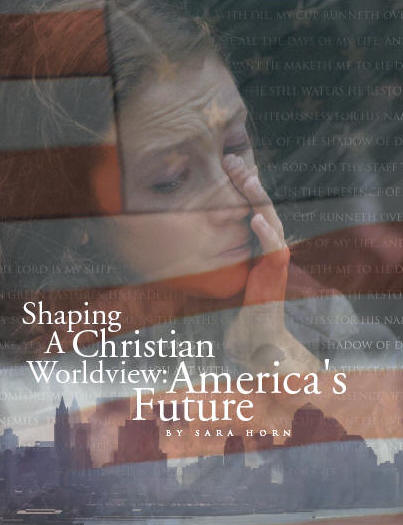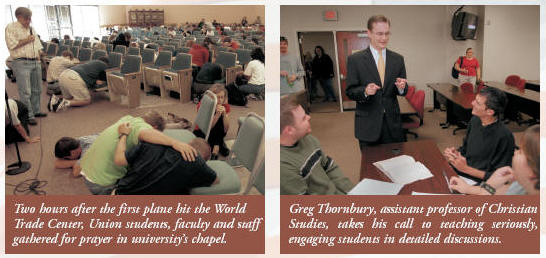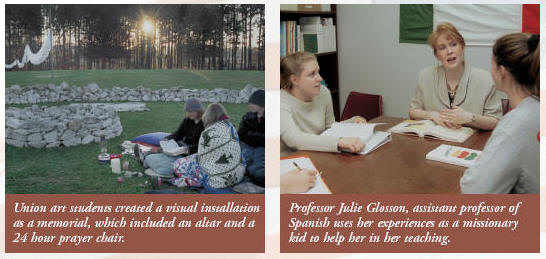|
|
Burning buildings. Tear-stained faces. American flags hanging everywhere. |
| In a post-modern world where almost anything
goes, the belief in good and evil has resurfaced and where once the cry
for a Christian worldview was strong, it cries out even louder today. At
Union University, that cry is being answered with committed faculty,
dedicated staff and knowledge- hungry students, all seeking to improve
America’s future by embracing the idea of incorporating a Christian
worldview in everything that they do.
In a new book scheduled to be released in the spring of 2002, Shaping a Christian Worldview, edited by Union President David S. Dockery and Gregory A. Thornbury, assistant professor of Christian studies, more than 18 Union faculty discuss the issues of what it means to bring one’s Christian worldview to bear in all areas of life. “It is the singular responsibility of Christian higher education to teach interdisciplinary thinking to the students in its charge,” says Thornbury, director of the Carl F.H. Henry Center for Christian Leadership. He says many Christians live in a “ghetto mentality” of loving the Lord, disconnecting that devotion from all other facets of living. “In Romans chapter eight, we read how the creation is groaning and buckling under the weight of sin,” says Thornbury. “We need to be active change agents, bringing the solution to this fallen world in which we live.” By sharing ideas between the disciplines so that someone who is in physics understands that it’s not just the theologian’s job to think about theology, and visa versa, Thornbury says culture can gradually be changed for the good. Christianity and the Liberal Arts“A liberal arts education is obviously very good in that it gives you a broad exposure to knowledge and raises a lot of questions about what is right and wrong,” says Dr. Jimmy Davis, associate provost and professor of chemistry. But just having a liberal arts education isn’t enough – it has to be done with a Christian worldview so that answers can be framed in the right context where humanity is given value, says Davis. The events of Sept. 11 have reminded us how important that is. “More than ever, since Sept. 11, we know the importance of our graduates leaving fully equipped with the facts, insights – all wrapped in a wonderful package of knowing how to turn to God, asking for wisdom to interpret,” says Dr. Barbara McMillin, dean of the College of Arts and Sciences and associate professor of English. The critical point, says McMillin, is avoiding the assumption that shaping a Christian worldview means that it’s done only in Sunday School or Old and New Testament classes. “It’s not how I view an event that’s just related to church, and it’s not just how I view issues that arise in a Christian setting – it’s how I view everything I encounter,” explains McMillin, adding that Union is embracing that notion by utilizing a worldview that teaches students how to think critically. It is that critical thinking that is so important for students to understand, emphasizes McMillin. Giving an example of the theory of deconstruction, a philosophy within literary criticism that says there are no absolutes and no right or wrong way to read the text, she says that there is a way to explain this type of philosophy to students, even when she disagrees with the literary approach. “I’m not afraid because I know there is a truth, there is a right or wrong,” says McMillin. “I can tell my students about it without buying into the philosophical belief of it. There’s a freedom there to know I can disagree with a particular theory and to know why I disagree with it.”
Equipping the studentsJulie Glosson, assistant professor of Spanish, who grew up in Columbia, South America as a “missionary kid,” sees her role as a calling to help her students see and understand more of the world outside the United States. “It’s exciting to share with my students other cultures and to put faces on people,” says Glosson. “So many times we talk about saving the lost, but in order to really love someone you have to know their name.” Glosson says it’s important for students to look outside their inner circles of Christianity to see that there are other people who aren’t included – people that even jargon or language can exclude. “By educating students to be aware of how their language and behavior is perceived both positively and negatively, it will help make them more effective in all areas of the world,” says Glosson, “not just here in America, and not just in exclusive Christian circles. I think that has a lot to do with our new mission statement.” “What happened on Sept. 11 caused the world to become smaller for everyone,” says Todd Brady, minister to the university. “No longer is it America and the rest of the world, it’s the global community that we live in. It’s definitely caused people to think differently about international relations.” “In a crisis time such as this,” says Dr. Hal Poe, professor of faith and culture, “Christians have a window of opportunity, because the broad culture itself cannot provide the answers to the questions people are asking.” Poe says that Christianity provides an integrating basis for a liberal arts education that doesn’t exist apart from it. “At Union, there’s not an interest in teaching students what to think, but teaching students how to think,” adds Brady. “The Christian institution is the one that teaches people to think correctly within the whole of knowledge and helps put it all together within the context of all other life and knowledge.”
Equipping the facultyIf the Christian worldview is the subject, then the shapers would be the faculty. Out on the front lines for truth and sound thinking, faculty members at Union University are themselves consistently challenged in how to serve with excellence as role models and teachers for tomorrow’s leaders. “Sept. 11 underscored the significance of what we do,” says Dr. Carla Sanderson, provost and professor of nursing. “We used to know what ‘preparing people to live in a changing world’ meant. Now that meaning is something very different.” According to Sanderson, several good things are happening in an effort to equip the faculty for their important task. Faculty participate in coffee discussions, reading books that challenge and stretch their understanding. Speakers are also brought in for lectures, seminars and workshops. “This understanding of new concepts bleeds over into the students, the classroom and what happens in the next discussion,” explains Sanderson. “The reason it works is because God wants this to spread – He’s planting these seeds. He wants nothing more than for this university to bring glory to His name.” “Education with a purpose, the highest purpose, is what Union is,” says Sanderson. “It’s a connection.” Sanderson says Union is a place that is serious about apologetics. “The stakes have gotten high,” says Sanderson. “When people are dying because of the acts of fanatic religious people, they’re going to need hope. I see bright promise for our work in witnessing to the world, because we’ve got their attention. People’s hearts are receptive and we need to be the kind of place that provides opportunities to articulate the hope we have.” |
|


